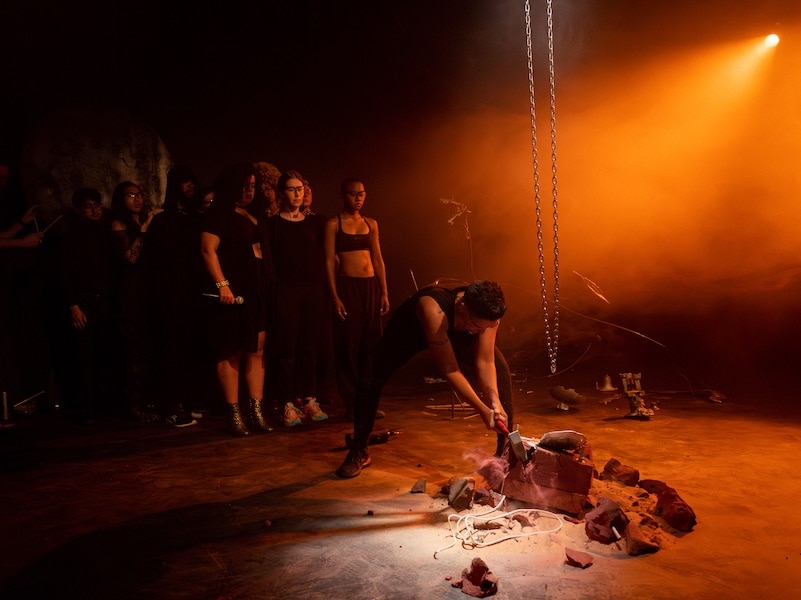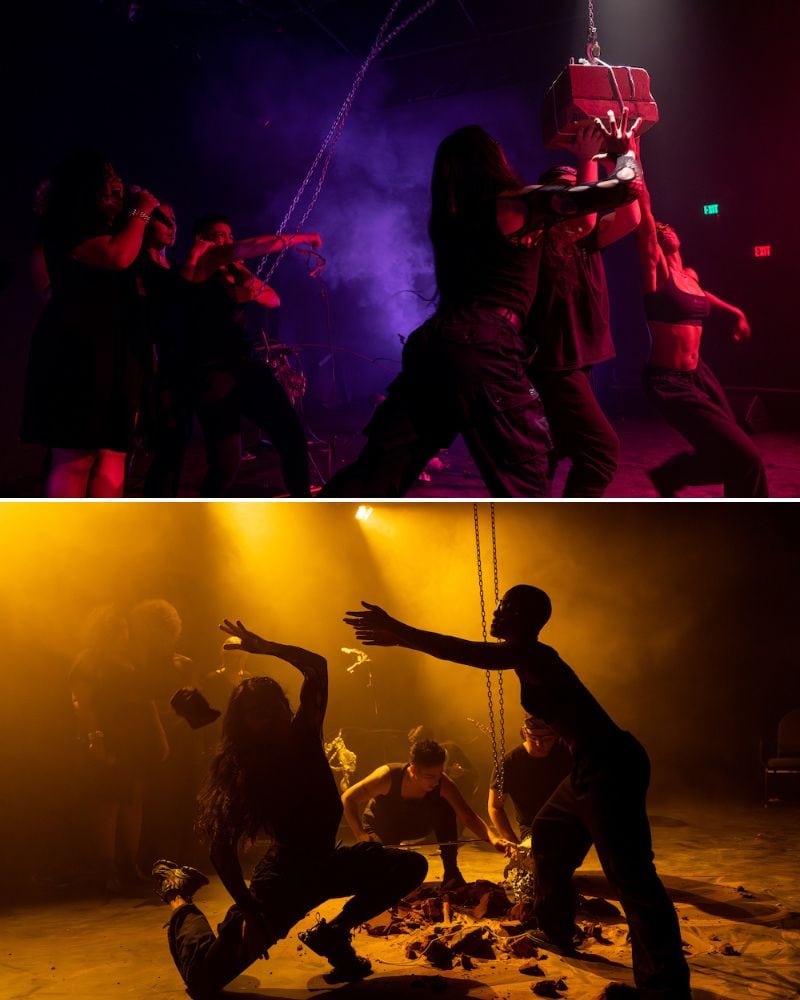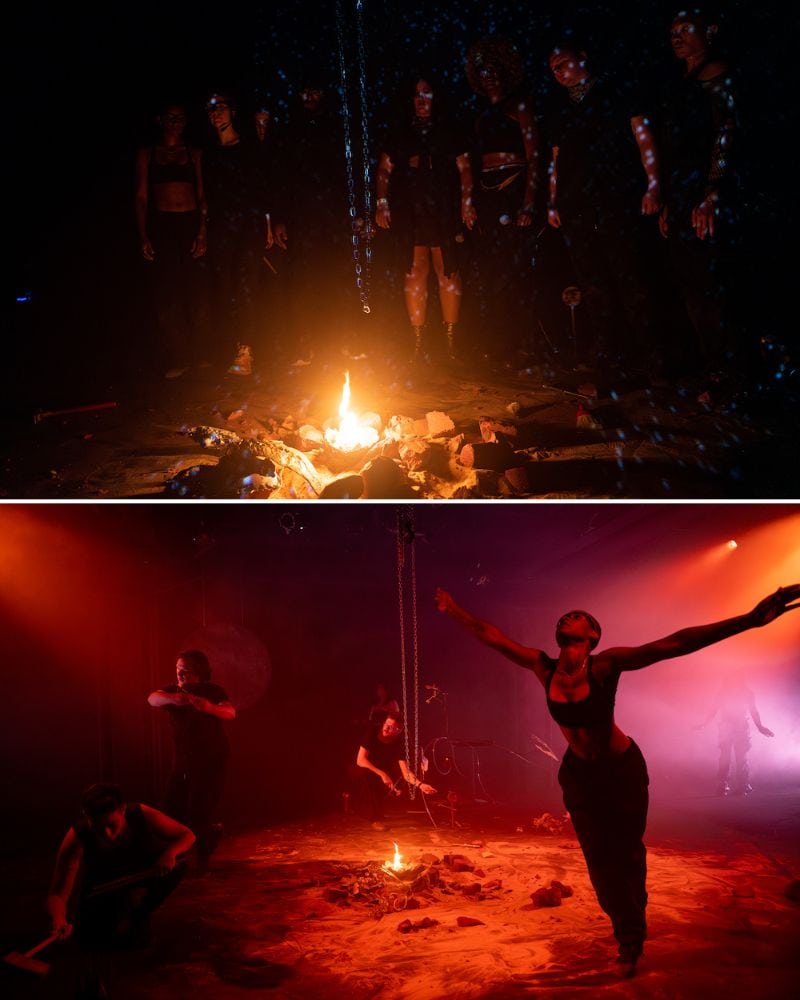On paper, the project promises an artfully woke affront to the gun lobby and anti-queer culture warriors: Assault rifles are cut up and melted down into props for an experimental sound-and-movement performance by a dozen artists who identify as LGBTQ+. “By queering sound and metal,” the show’s pitch goes, “we ask ourselves the question: How can we reclaim materials that were never made in our image?” Thus the title of the work, Never in Our Image — a “gun transformation opera,” conceived and directed by Stephanie Mercedes — playing one more weekend at Source presented by CulturalDC (the “We make space for art” folks).

The 55-minute performance is stunning sonically, scenically, and choreographically — haunting in its ominous grace, alarming in its force and power. The lighting stays dim. Black-garbed opera singers, dancers, and percussionists move through the space to the sound of recorded electronica and eerily gorgeous but wordless vocals. Early on some in the ensemble dance freeform as others pound into smithereens a block of kiln-fired clay. Shards fly everywhere. A blowtorch lights a fire in the rubble. A cloud of particulate fills the air, impossible not to inhale (a facemask would be a good idea). Finally, out of the flaming debris is extracted an object molded of smelted metal. The object is held aloft, reverentially, as if a totem of weaponry redeemed.

As the show goes on, similarly abstract molded metal objects become percussion instruments. The dancing becomes ever more expressionistic; the operatic vocalizing, more emphatic. It is as if we are witnessing a cultic catharsis.
And indeed, we are. This high-concept performance is the culmination of two enactments that have gone before: an Act I “gun cutting ceremony” on May 19, 2023, and an Act II “gun melting ceremony” on July 8. The cold forged objects that appear before us in this Act III “gun transformation opera” have a past. They come imbued with meaning. They represent resistance annealed in queerness.
Without the backstory of the two prior ceremonies in mind (be sure to watch both videos below), however, the experience of this experimental hybrid of music, movement, and happening can seem beautiful but baffling. What, after all, does it mean to “queer” something? I have seen narrative and characters queered in theater (as STC did with Shakespeare’s Shrew). But how does performance art queer components like sound and metal? It’s rather a mystery — yet one senses here a fresh and rich esthetic that warrants attention.

The prime mover of Never in Our Image, Stephanie Mercedes, is described as “an uncategorized queer Latinx artist who choreographs large-scale performances and installations based in sound. Mercedes transforms weapons into musical installations and works of art.” The originality of her approach brought to mind the early experimental work of Julie Taymor with puppetry — and we all know what epic stories she went on to tell.
I can’t say whether Never in Our Image advances the cause of gun reform or LGBTQ+ rights. That’s a lot to ask. But this much is certain: the community forged around this art of aspiration represents a movement that matters.
Running Time: Approximately 55 minutes with no intermission.
Stephanie Mercedes’ Never in Our Image – ACT III – Gun Transformation Opera plays September 21, 22, and 23, 2023, presented by CulturalDC at Source Theatre, 1835 14th St NW, Washington, DC. Tickets (Pay What You Can, $1 to $50) can be purchased online.
A signed waiver is required for admission, and audience members are given eye-protective goggles.
Never in Our Image – ACT III – Gun Transformation Opera
Creator and Director: Stephanie Mercedes
Opera Singers: Fairouz Foty, Brittany Hunter, Jim Williams, Amanda Deluzio, Charlotte Rachel Richardson-Deppe
Dancers: Antonius Bui, Peter Pattengill, Shekinah
Percussion: Houry Kandoyan, Jonathan Sotelo, Maia Foley, John Matthew MacGovern
Sound Engineers: Zeos Greene, Pablo Sosa
Video Projection: Deja Collins
Lighting Design: Faryn Kelly
Techno Composition: DJ Kel
Artist Talkback moderated by Ashley Molese (for ticketholders) following the performance on September 21.
Ashley Molese is an independent curator and cultural producer. She specializes in site-specific commissions, collaborating with artists to conceive and produce large-scale installations in traditional spaces and outdoor environments. Her work focuses on the intersections of art, science, and technology and incorporates universal design principles into public engagement. Her past curatorial projects include FUTURES at the Smithsonian Arts + Industries Building, Light City, Artscape, the Baltimore Book Festival, School 33 Arts Center, the Overload Poetry Festival, and Arts Access Victoria. She provides public art consulting for galleries and festivals, non-profit and corporate partners, and arts and entertainment districts. Ashley received a Master of Fine Arts in Curatorial Practice at the Maryland Institute College of Art in 2014 and completed her Master of Arts in Arts Management from RMIT University in Melbourne, Australia, in 2010. She is based in Washington, DC.
Never in Our Image – ACT I by Stephanie Mercedes from CulturalDC on Vimeo.




